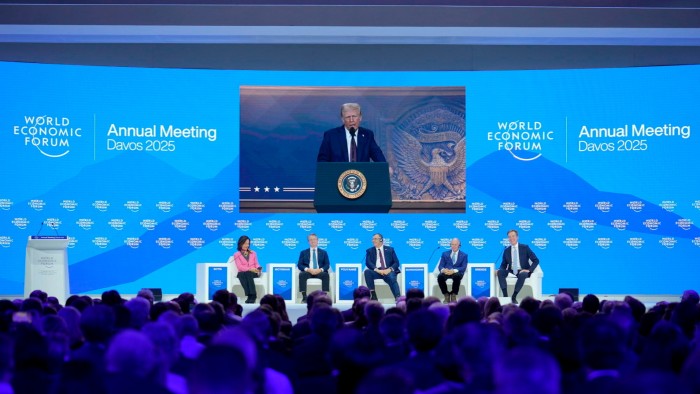Washington sits more than 4,000 miles from Davos, but US President Donald Trump dominated debates at the World Economic Forum’s annual meeting last week. In an online address to the gathering he pledged to end “the ridiculous and incredibly wasteful Green New Deal”, pull America from “the one-sided Paris climate accord” and “unlock the liquid gold” of fossil fuels. Yikes. So how did Davos delegates respond? Read on for our top six takeaways.
Irrespective of Trump, business is alarmed about climate shocks
One top point of gossip among American executives last week was whether their friends in Los Angeles have lost homes in recent wildfires. This, in turn, sparked dire predictions about how extreme weather events will create rising economic stress and politically explosive migration.
Indeed, in a poll of WEF delegates, climate issues dominated the risk tables — and during the meeting scientists predicted that the world is on track to warm by about 2.7 degrees above pre-industrial average, a level that will be very damaging.
A crumb of comfort came from one scientist who told a Davos dinner that two decades ago he expected 5 degrees of warming or more — until green policy measures and innovation changed this for the better. A bit.
Green tactics — and language — are shifting
A common refrain from progressive politicians, executives and activists was that they must change how they present green activism. That means focusing more on growth, less on phrases such as “net zero” or “green transition” — let alone “environmental, social and governance” — and embracing buzzwords such as “infrastructure investment” and “energy efficiency”.
“You need to show how this helps business,” explained Katie McGinty, Johnson Controls’ chief sustainability officer, who said she now talks about green building solutions in terms of how this improves resource efficiency — and thus cuts costs.
Scope 3 rules are in trouble
Most executives I encountered in Davos are still embracing forms of Scope 1 and 2 reporting (disclosing emissions from their companies’ operations and energy usage). But ambitions around Scope 3 (emissions from their supply chains and the use of their products) are crumbling.
The EU and California still back this sort of disclosure. But Gavin Newsom, California’s governor, will need so much federal aid after the LA fires that he may not have the political strength to challenge Trump-backed policies that oppose green reforms. If Europe keeps stagnating, Brussels will face pressure to loosen climate rules too.
New green champions are emerging
Trump’s election victory, and Europe’s loss of confidence, is propelling other regions into the green spotlight. Davos delegates agreed that China is now a key driver — if not the leading proponent — for green tech. This is for commercial reasons if nothing else (it dominates sectors such as solar panel and electric vehicle manufacturing).
But since Beijing was keeping a low(ish) profile in Davos this year, delegates from the Middle East were among the most visible green tech enthusiasts. Yes, really: Khalid al-Falih, investment minister for Saudi Arabia, loudly extolled the kingdom’s massive investments in solar energy, hydrogen and so on. And Japan is pressing ahead steadily with the green transition, regardless of backsliding elsewhere, says Takeshi Niinami, chief executive of drinks producer Suntory.
AI with everything
Artificial intelligence dominated this year’s Davos debates, as well as the Promenade, where AI slogans were plastered in places that used to carry ESG signs. However, tech luminaries, such as Demis Hassabis, the Nobel Prize-winning Google DeepMind co-founder, stressed that AI could help with climate change, say by tracking emissions far more accurately than before. The AI explosion is also forcing Big Tech to innovate around electricity supplies, creating more momentum for renewable energy.
Don’t lose hope
The best moment of this year’s Davos meeting, for me, was when Muhammad Yunus, the Bangladeshi professor who founded the microfinance movement, spoke to a joint party organised by FT Moral Money and Imagine (the global leadership network co-founded by Valerie Keller and Paul Polman.) A year ago, Yunus was facing a six-month prison sentence over labour law violations, in what his supporters called a trumped-up case. But then a grassroots protest movement unexpectedly sparked a revolt — and Yunus was suddenly propelled into the role of president instead.
The lesson? Nobody should ever lose hope in the idea that the world can change for the better, as long as people keep fighting for change “with imagination”, as Yunus told the gathering. Climate activists who are feeling depressed or horrified about Trump’s policy plans should remember that change can emerge in unlikely ways.
Smart read
One of the hottest topics at this year’s Davos was the data centre boom — as per Trump’s Stargate announcement — and the question of how this will be financed and fuelled. Many tech bros are excited about the potential for small modular reactors to provide a green(ish) solution. But this hard-headed report from Goldman Sachs on nuclear energy is a sobering riposte to the Silicon Valley hype — albeit encouraging for anyone hoping for energy diversification.
Read the full article here

